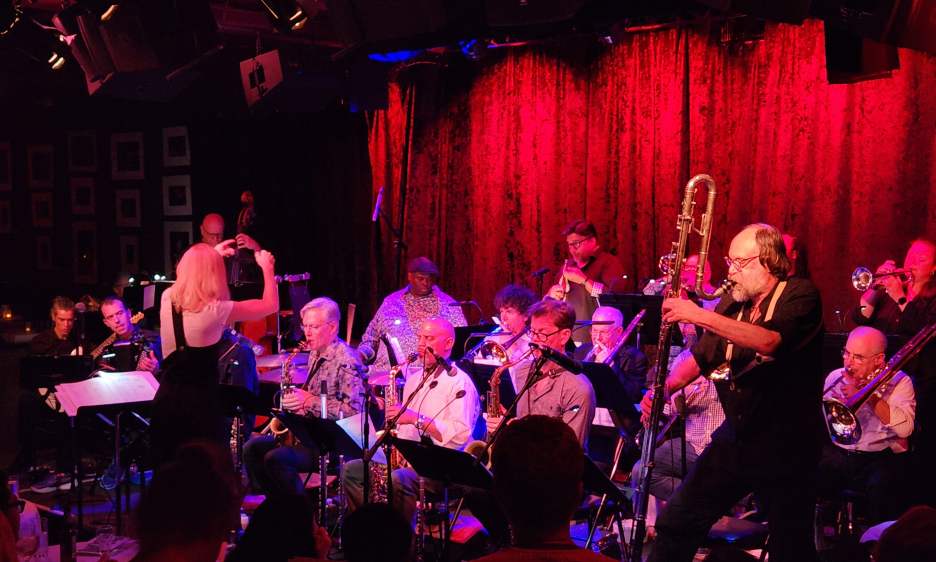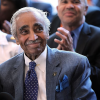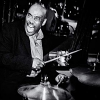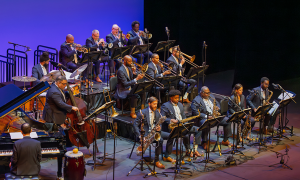Home » Jazz Articles » Live Review » The Maria Schneider Orchestra at Birdland
The Maria Schneider Orchestra at Birdland

Courtesy Paul Reynolds
Every aspect of the performance–even including, in the best way, the musicians' identities–bowed to Schneider's unique mix of ambitious themes and meticulously written and arranged orchestral music.
—Paul Reynolds
Birdland Jazz Club
New York, NY
May 30, 2025
The late set by Maria Schneider and her orchestra on Friday at Birdland Jazz Club was so engrossing as to be a world unto itself. Every aspect of the performance—even including, in the best way, the musicians' identities—bowed to Schneider's unique mix of ambitious themes and meticulously written and arranged orchestral music.
The composer-arranger-conductor doesn't fit any mold but her own. Her singular vision may be one reason she's among the most celebrated jazz figures—if not music figures—who aren't widely known outside the community. Her low public profile comes in spite of her Midwestern charm—she hails from small-town Minnesota—and collaborations with high-profile musicians from across the musical spectrum, from Gil Evans (who first employed her, as a music copyist) to David Bowie and Sting to soprano Dawn Upshaw, for whom she wrote and arranged a classical piece. (Schneider's uncompromising approach to the business may also be a contributor to her relative obscurity. Outspoken about how the digitizing of music has impacted musician's recording incomes, Schneider makes little of music available on streaming platforms like Spotify.)
Among Schneider's many gifts is an ability to grasp the kind of ideas that typically power books, not music, and turn them into expressive and accessible compositions and arrangements. Her last major work, the double album Data Lords (ArtistShare, 2020), explored no less than the promise and threats of the digital revolution.
At Birdland, she played several pieces from the project, which was a finalist for the 2021 Pulitzer Prize in music. The best, "Sputnik," was her warm and affectionate tribute to what she called the "exoskeleton of beautiful [1960s] satellites" that floated above the earth in the era before, she joked, we knew the "nefarious uses they could be put to." Starting gently and evoking quiet space, the piece became a showcase for the contrabass sax of Scott Robinson, whose eerie but emotive playing included wafting sounds that evoked distant signals, before concluding with gentle orchestral washes.
The set's ultimate example of how Schneider humanizes—and renders in music—complex concepts was a surprisingly reflective piece that rendered America's growing political polarization in orchestral form. She introduced it from the stand by lamenting the decline in political dialog across left and right, noting that her father once flew Hubert Humphrey around Minnesota in his plane as her mother served as a Republican chairperson. "American Crow" began somewhat sharply, before the soft piano of Gary Versace and a restrained horn arrangement laid a bed for Mike Rodriguez's wistful trumpet soloing before concluding—some 10 minutes later in troubled dissonance—as a reflection of today's divisive partisanship, Schneider said in her introduction.
As such pieces showed, Schneider's compositions are more lengthy thematic journeys than traditional jazz structures in which the musical theme is followed by several freewheeling solos over the changes.
Which brings us to the careful approach to solos within the Maria Schneider Orchestra. With an obvious parallel to Duke Ellington, Schneider writes with particular orchestra players in mind. Among the delights of that compositional tailoring is to give voice to such underrated players as Rodriguez and Robinson. Schneider often seems to write a good deal of each solo, too, in an approach that's closer to the precision of a classical concerto solo than the improvised blowing of a typical big-band solo excursion.
Among the few exceptions to this composed soloing were the more customary solos (from trumpeter Greg Gisbert and altoist Steve Wilson) in the set's only non-original piece, "Giant Steps." Perhaps unsurprisingly, this was no ordinary arrangement. Schneider mixed it up with modulations and multiple meters, which Schneider reported she introduced after some constructive criticism (along with praise) from Herbie Hancock during a random airport encounter with the pianist.
The set-closing "The Great Potoo" drew from Schneider's passion for ornithology—and not of the Charlie Parker variety. As in the partisanship-inspired piece, the horn voicings evoked the subject, and in this case the apparently distinctive low-roar call of the Great Patoo bird. The tenor solo by Donny McCaslin—who won a Grammy for a recorded solo with the MSO—repeatedly echoed that call in an outing that was both dazzling and humorous.
The refined textures of "The Great Potoo" derived not only from Schneider's arranging gifts but from the diversity of the orchestra's instrumentation. Its 18 members at Birdland included guitarist Jeff Miles and accordionist George Flynn.
The lightness of the piece was yet another reminder that Schneider's intellectual ambitions do not come at the expense of approachability and humanity. And, perhaps because she is so affable, Schneider somehow avoids pretension as well. However rich her music is, it is easily digested.
Tags
Live Review
Maria Schneider
Paul Reynolds
Lydia Liebman Promotions
United States
New York
New York City
Birdland Jazz Club
Gil Evans
David Bowie
Sting
Data Lords
Gary Versace
MIKE RODRIGUEZ
duke ellington
Greg Gisbert
Steve Wilson
Herbie Hancock
Charlie Parker
Donny McCaslin
Jeff Miles
George Flynn
About Maria Schneider
Instrument: Composer / conductor
PREVIOUS / NEXT
Support All About Jazz
 All About Jazz has been a pillar of jazz since 1995, championing it as an art form and, more importantly, supporting the musicians who make it. Our enduring commitment has made "AAJ" one of the most culturally important websites of its kind, read by hundreds of thousands of fans, musicians and industry figures every month.
All About Jazz has been a pillar of jazz since 1995, championing it as an art form and, more importantly, supporting the musicians who make it. Our enduring commitment has made "AAJ" one of the most culturally important websites of its kind, read by hundreds of thousands of fans, musicians and industry figures every month.



























